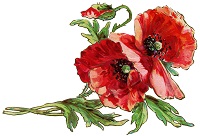|
McFatridge Boys Montgomery Boys Spindle Boys  The Whitewright Sun
Friday, December 6, 1918 pg.7 3 WHITEWRIGHT FAMILIES HAVE NINE IN FRANCE Three McFatridge boys, three Spindle boys, three Montgomery boys constitute Whitewright's triumvirate of "triplets" in France. Letters have just been received from Vernon, Clarence and Norman McFatridge, all in France, but serving the colors in different capacities. Vernon's letter was dated November 13, two days after hostilities ceased. At last account the boys were all well. Recent communications from Grady, Buell and Frank Spindle, the first two in France and the latter in England, indicate that these deserving boys have weathered the storm. Frank is with the navy and on one of our country's dreadnaughts now participating in the taking over of German submarines in English waters. Buell writes that he will be attached to the army of occupation for an indefinite stay on the German frontier. He is with the air service. Grady was also patiently pursuing his work with the A.E.F. when last heard from. Green Montgomery writes that his duties are very similar to those of civilian life in Grayson county, that of guarding German prisoners. He was a guard at the county road camp here before his enlistment. Emmerson Montgomery is a graduate of the army veterinary school and is a full-fledged horse doctor, while Virgil is still connected with the engineers. The Whitewright Sun
Friday, December 17, 1918 pg.1 WRITES FROM FRANCE The Sun is in possession of a letter of considerable length, written by Vernon McFatridge to his father, F.R. McFatridge of this city. Vernon writes entertaingly and with a style that lends interest to his narration of events coming under his observation in France. He is in the artillery section of the 36th Division, and reluctantly confesses that his regiment had not been in action, but was daily expecting to be moved to the front when the armistice was signed. He expresses his regret that he did not participate actively in the big fight, but relates an exciting all-day fight which his convoy had with submarines on the way over, and hopes that this may privilege him to wear the service stripes when mustered out. In all, he seems to be well pleased with his military life, says he has been well cared for, and that he can obtain good cigars from the Y.M.C.A. at cost, or nearly as cheaply as he can buy smoking tobacco here. Referring to the future, he says his military training, observation and experience will be a great help to him. Military Veterans Susan Hawkins © 2024 |